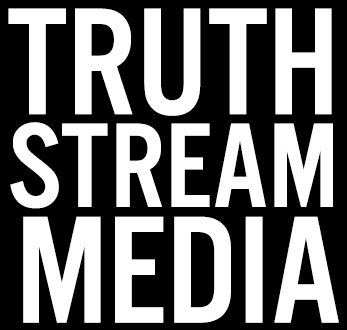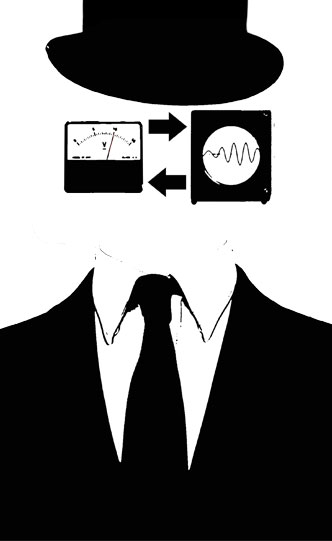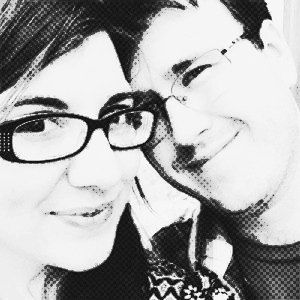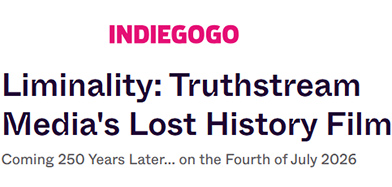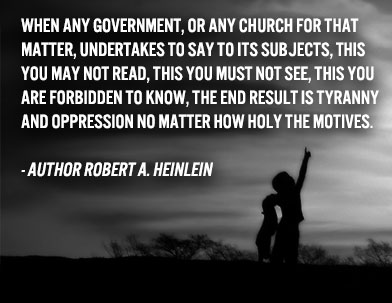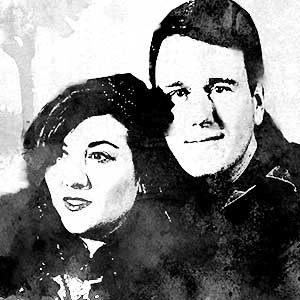Soylent Green: Society Feeds Off Its People
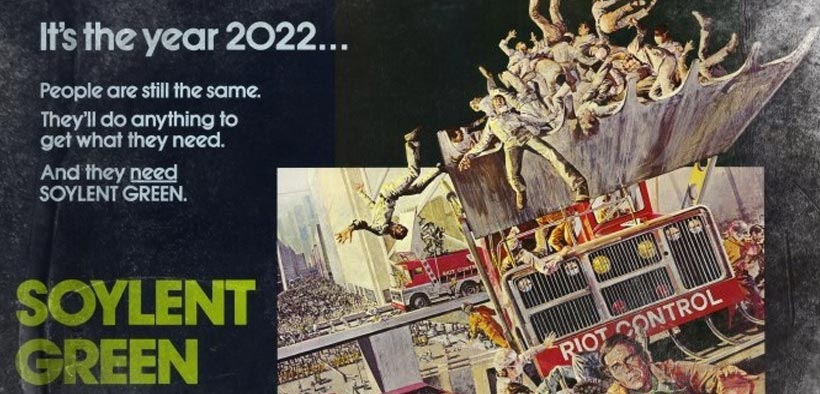
Spoiler Alert: Soylent Green is people.
The classic 1973 dystopic film Soylent Green starring Charlton Heston depicts a world overrun by hoardes of people in dense cities suffering from a lack of resources or any vestige of hope for the future.
On one level, it is a morality tale personifying the neo-Malthusian myth of overpopulation given new blood by the 1968 Paul Ehrlich (and partner John P. Holdren) horror story Population Bomb as well as the Club of Rome’s apocalyptic modeled described in their 1972 publication Limits to Growth. Both give urgency to a) grinding population growth to a halt, b) cutting off the population’s consumption of resources and c) granting supposedly all wise aristocratic greater rule over society and control of its future development, which aims to institute an austere and subservient general population.
On a parallel level is a metaphor played out through the literal plot revelations which exposes how this society — and by extension others — thrives on eating its own. A semi-civilized cannibalism adapted to feed the large and heavily dependent population.
In Soylent Green, just as in the companion dystopic film Omega Man (1971, also starring Charlton Heston), the “haves,” those with jobs or status in society, guard their homes against the masses, often sleeping on their doorsteps, at gun point while they enjoy basic, though, rationed commodities. Meanwhile, a few elite-“haves,” mostly connected the ruling Soylent Corporation, live in walled-off communities protected by armed guards, where they enjoy luxuries like strawberries, a supply of concubine companions referred to dismissively as “furniture,” and a special food not available to the general population at all — meat.
With this stark inequality as a backdrop, we more closely examine the dynamics of the Soylent Green society. Heston’s character, Robert Thorn, is a police officer assigned to riot duty in the market place, where the plebiscites line up for their dole of government rations — highly processed food pellets that come in red, yellow and the new, and most popular flavor, green.
The “green” flavor, we are told, is new and made of delicious/nutritious “high protein plankton.”
Another cop warns Thorn that the market has just run out of Soylent Green, a sure sign that the crowd will soon revolt. The officers first discuss amongst themselves, then warn the crowd, that the “scoops” are coming, ordering the masses to disperse.
The scoops, we learn, are large trucks whose blades “scoop” up people in the crowd and dump them into the truck bed.
During this scene, an assassin also emerges, developing the plot and sending Thorn on a search for the assassin and what he later learns is his apparent connection to the Soylent Corporation.
During this quest, the inequities in society are revealed, as Thorn gets a first hand glimpse of the elite life that has been kept from him.
Meanwhile he also comes across a key clue from the elderly learned society who frequent a library: namely, that the oceans are dying, rendering the claim that Soylent Green is made of plankton a disillusioning myth.
Instead, we see more than ever how death feeds the cycle of this lifestyle.
Motivated by the excess and unsustainable population that must be supported, as well as by the bleak potentials offered to its citizenry, the elderly are encouraged to ‘contribute’ by acquiescing to euthanasia at bright welcoming centers. Enticed to “go home”, patients are treated to a bright, vivid and fulfilling “end of life” multimedia sequence featuring the theme of choice set to music and natural scenery as a superficial but stimulating final rite — before the life is terminated.
In the film’s final revelation, Thorn discovers the big secret that looms large on the meaning in this Soylent-based society. Like all societies, the power has conspired to hide from its people a dark but important factor to the order of things.
In trying to stay with the body of his euthanized best friend, Thorn inadvertently traces back the supply of Soylent Green. The bodies are hauled off and dumped at a factory run by the Soylent Corporation, where they are processed into, of course, Soylent Green, the most popular food staple.
The assassin’s trail Thorn has followed emerges again as well, leads to a sustained effort to coverup to contain this big secret and prevent it from leaking. As Thorn has already begun to realize, the people in this nightmare society are not sustained by eating plankton from the ocean at all, but from consuming other people — a cultural fallacy typical of thoroughly debased and uncivilized people, a culture that isn’t “sustainable” at all.
Whether one sees the environmental rhetoric of “sustainability” propagated by this film and the memes of the politic society for the Eugenics agenda it is or not, it is clear that such a system that feeds on its own death is headed in a downward spiral.
Thorn tries to warn about this dark and disturbing revelation in his final moments, though like so many figures ahead of their time, his prophetic knowledge seems to fall on deaf ears.
“I’ve got the proof. The ocean’s dying; the plankton’s dying. It’s people. Soylent Green is made out of people,” Thorn tells his police sergeant as he lay wounded, dying and exhausted. “They’re making our food out of people. Next thing, they’ll be breeding us like cattle for food. You’ve gotta tell them. You’ve got to tell them,” Thorn exclaims in the harrowing final scene. “You tell everybody. Listen to me, Hatcher. You’ve gotta tell them, Soylent Green is people! We’ve gotta stop them. Somehow!”
In real life, the subtle forces transforming society into a larger combine at the explicit cost of personal freedoms is indeed directing us, through a eugenics philosophy, into a rationed society where dehumanization is the norm, life is cheap and the “greater good” compels a number of significant and limiting sacrifices.
Under Eugenics, encouragement of selective breeding and debasement of the chattle classes have enacted this kind of sick feedback loop, where the population is dependent upon a rationed distribution of resources ultimately based upon death. Not only are these people reduced to meaningless lives, but they are subjugated by the ruling corporation that incentivizes their subservience.
In the vein of Aldous Huxley’s Brave New World cautionary tale, the population may not only be engineered but controlled through narcotic-induced bliss. A poster using the handle Sol Roth, Thorn’s buddy in the film, made an insightful comment on the Sciflicks forum, noting that Thorn says at one point in the film: “Eat some Soylent Green and calm down.” According to Sol Roth:
This indicates to me that Soylent Geeen has narcotic and addictive properties, which keys in with the theory that human cannibalsim produces some form of euphoria… This implies that Soylent Green serves 2 purposes. Recycling human tissue and population pacification through ingested narcotics.
Under this dark interpretation, the opiate of the masses is the flesh of the underclasses.
A controlled and degradated condition, to be sure. And one which we are rapidly headed towards under the new world order visionaries.
In fact, a European Commission research arm along with the World Wildlife Fund co-financed a July 2011 report, “Scenarios Toward a One Planet Economy in Europe,” in which one vision portrayed a stark future where “nearly every aspect of life is heavily regulated by the state“:
“Recycling and waste reduction measures are high, as households pay high taxes on land filling waste and are heavily penalised when per capita waste quotas are exceeded. Most travel, when possible, is done by high quality public transport (including an extended network of high-speed trains) and non-motorised transport.”
It continues:
“In terms of food, European citizens eat less meat and dairy (due in part to high prices) and spend money on a smaller amount of higher quality food. The wealthy can still afford the high prices of meat, fish and other animal products. Overall, however, life expectancy has stagnated due in part to increasing working hours.”
The same agenda was propagandized in the short animated film Plannedopolis where travel and lifestyle is tightly regulated, meat is off limits to ordinary people and authoritarians control society at large:
Obamacare, like other socialized medical systems, embodies this, where technocrats use their metrics and analysis to weigh the value of granting care, of treating disease and dispensing pharmaceutical medications, while birth control & abortions coupled with death panels create a final check on the boundaries of this illusory prison sold as a fair and equitable world. Like the film Network aptly notes, the food is not fit to eat, this air is not fit to breathe.
Today, we are fed GMO foods, medicated water, plant-based meat imitations and likely cloned meat, without being told what we are eating & drinking and all without giving our consent (except through ignorant complicity) to consume it. Not surprisingly, the rationale we’ve been given by collectivist technocrats like Bill Gates for the emphasis on transforming to genetically-modified agriculture and then depending upon it, for instance, is not the revelation that corporations can patent & profit from its use, but the idea that is will feed a hungry world and sustain a threatened planet with limited resources.
An unabashed wolf-in-sheep’s-clothing, George Bernard Shaw, a founder of the Fabian Society which directed the development of the technocratic collectivist (oligarchical-controlled socialist) system, revealed the sinister degree of control that such a new world would exert over its people:
Socialism means equality of income or nothing… under socialism you would not be allowed to be poor. You would be forcibly fed, clothed, lodged, taught, and employed whether you like it or not. If it were discovered that you had not character enough to be worth all this trouble, you might possibly be executed in a kindly manner; but whilst you were permitted to live you would have to live well. [emphasis added]
Like Thorn in the film, we must warn are fellow people about the dark roots of our society with stock in exploiting, regulating and dominating those who don’t share stock in the control structure. Chewed up, spit out, and eaten alive.
“We’ve gotta stop them. Somehow!” Amen.
